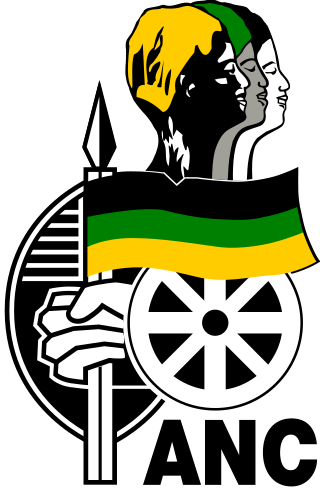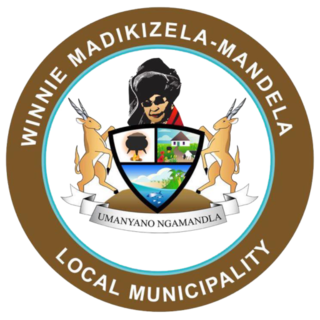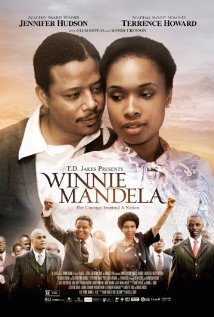
Winnie Madikizela-Mandela, also known as Winnie Mandela, was a South African anti-apartheid activist and the second wife of Nelson Mandela. She served as a Member of Parliament from 1994 to 2003, and from 2009 until her death, and was a deputy minister of arts and culture from 1994 to 1996. A member of the African National Congress (ANC) political party, she served on the ANC's National Executive Committee and headed its Women's League. Madikizela-Mandela was known to her supporters as the "Mother of the Nation".

Albertina SisuluOMSG was a South African anti-apartheid activist. A member of the African National Congress (ANC), she was the founding co-president of the United Democratic Front. In South Africa, where she was affectionately known as Ma Sisulu, she is often called a mother of the nation.
Necklacing is a method of extrajudicial summary execution and torture carried out by forcing a rubber tire drenched with petrol around a victim's chest and arms, and setting it on fire. The term "necklace" originated in the 1980s in black townships of apartheid South Africa where suspected apartheid collaborators were publicly executed in this fashion.
The following lists events that happened during 1991 in South Africa.

The African National Congress Women's League (ANCWL) is an auxiliary women's political organization of the African National Congress (ANC) of South Africa. This organization has its precedent in the Bantu Women's League, and it oscillated from being the Women's Section to the Women's League from its founding, through the exile years, and in a post-apartheid South Africa. After women were allowed to become members of the ANC in 1943, the ANCWL was created as the means by which Black South African women could contribute to the national liberation struggle by channeling Black women's political activity into the ANC by way of the ANCWL.

Pumla Gobodo-Madikizela is the Research Chair in Studies in Historical Trauma and Transformation at Stellenbosch University in South Africa. She graduated from Fort Hare University with a bachelor's degree and an Honours degree in psychology. She obtained her master's degree in Clinical Psychology at Rhodes University. She received her PhD in psychology from the University of Cape Town. Her doctoral thesis, entitled "Legacies of violence: An in-depth analysis of two case studies based on interviews with perpetrators of a 'necklace' murder and with Eugene de Kock", offers a perspective that integrates psychoanalytic and social psychological concepts to understand extreme forms of violence committed during the apartheid era. Her main interests are traumatic memories in the aftermath of political conflict, post-conflict reconciliation, empathy, forgiveness, psychoanalysis and intersubjectivity. She served on the Truth and Reconciliation Commission (TRC). She currently works at the University of the Free State in Bloemfontein as a senior research professor.
James Seipei, also known as Stompie Moeketsi or Stompie Sepei, was a teenage United Democratic Front (UDF) activist from Parys, South Africa. He and three other boys were kidnapped on 29 December 1988 by members of Winnie Mandela's bodyguards. He was murdered on 1 January 1989, the only one of the boys to be killed.
Fred Bridgland is a British writer and biographer. During the Angolan Civil War, he wrote about South Africa's involvement in Angola and in the 1990s he revealed human rights abuses committed by UNITA rebels under the command of Jonas Savimbi. Critics have derided his biography of Savimbi, Jonas Savimbi: A Key to Africa, as the work of an apologist. Bridgland has denied this claim in interviews, saying rather he was just a biographer.

Winnie Madikizela-Mandela Municipality, formerly Mbizana Municipality, is a local municipality within the Alfred Nzo District Municipality, in the Wild Coast Region of the Eastern Cape province of South Africa. It is named after Winnie Madikizela-Mandela, an anti-apartheid activist and wife of President Nelson Mandela.

Bonginkosi Success Madikizela is a South African politician.

Winnie Mandela is a 2011 South African-Canadian historical drama film starring Jennifer Hudson and Terrence Howard as Winnie and Nelson Mandela. Based on Anne Marie du Preez Bezrob's biography Winnie Mandela: A Life, the film is directed by Darrell Roodt and co-stars Wendy Crewson, Elias Koteas and Justin Strydom. Image Entertainment released the film in theaters on September 6, 2013. It received generally negative reviews.
Amina CachaliaOLB was a South African anti-Apartheid activist, women's rights activist, and politician. She was a longtime friend and ally of former President Nelson Mandela.

Zindziswa "Zindzi" Mandela, also known as Zindzi Mandela-Hlongwane, was a South African diplomat and poet, and the daughter of anti-apartheid activists and politicians Nelson Mandela and Winnie Madikizela-Mandela. Zindzi was the youngest and third of Nelson Mandela's three daughters, including sister Zenani Mandela.
Abu Baker Asvat, also known as Abu Asvat or Abu nicknamed Hurley was a South African medical doctor who practised in Soweto in the 1970s and 1980s. A founding member of Azapo, Asvat was the head of its health secretariat, and involved in initiatives aimed at improving the health of rural black South Africans during Apartheid.

Daluxolo Christopher Mpofu is a South African lawyer, politician, and former businessman who was the National Chairperson of the Economic Freedom Fighters (EFF) from 2014 to 2019. He served on the Judicial Service Commission from 2017 to 2022 and formerly served as chief executive officer of the South African Broadcasting Corporation from 2005 to 2009.

Devikarani Priscilla Sewpal Jana was a South African human rights lawyer, politician and diplomat. As a member of the African National Congress (ANC) during the anti-apartheid movement, she participated in both legal activism as well as in the underground movement to end apartheid. She represented many significant figures in the movement, including South African president Nelson Mandela, Winnie Madikizela-Mandela, Steve Biko, Govan Mbeki, Walter Sisulu, and Archbishop Desmond Tutu. Jana was one of the very few South Africans who had access to political prisoners, including Mandela, in the maximum security Robben Island prison, and served as an emissary for coded messages between the political prisoners and the ANC leadership.

Sisonke Msimang is a South African writer, activist and political analyst based in Perth, Western Australia, whose focus is on race, gender, and politics. She is known for her memoir Always Another Country: A memoir of exile and home (2017) and The Resurrection of Winnie Mandela (2018), a biography of anti-apartheid activist Winnie Madikizela-Mandela.
Mavuso Walter Msimang is a South African civil servant and politician. He is a co-founder of African Parks, a Johannesburg-based conservation organization, and has also served as CEO of South African National Parks (SANparks). In the 1960s, he was a member of the military high command of uMkhonto we Sizwe (MK), the armed wing of the African National Congress (ANC).
Nocawe Noncedo Mafu is a South African politician currently serving as Deputy Minister of Sports, Arts and Culture. She has been a member of the National Assembly since 2014. She was Chairperson of the Portfolio Committee on Human Settlements from 2014 to 2019. Mafu is a member of the African National Congress.
Limpho Hani is a Mosotho–South African activist who is the widow of anti-apartheid activist Chris Hani. After her husband was assassinated in 1993, she had her own brief political career in the post-apartheid government, representing the African National Congress (ANC) in the National Assembly from May 1994 to August 1999. She also served on the ANC's National Executive Committee during that period. She has since remained in the public eye, partly because of the national symbolic importance of her husband's murder and partly because of her own activism in seeking to oppose parole for the killers.











